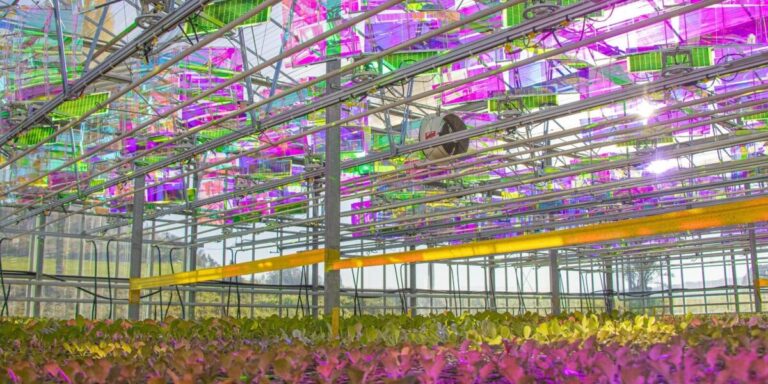Voltiris has launched its latest greenhouse pilot project, installing the new wavelength-selective PV system on a vegetable farm in the canton of Baselland.
Swiss-based agrivoltaic specialist Voltiris is offering a new solution based on a patented under-roof dichroic mirror concentrator system that integrates tracking systems and silicon PV panels.
The system is specifically intended for greenhouses to improve metrics for heating, electricity costs and CO2 emissions, while maintaining crop yields.
The latest pilot project is being carried out in collaboration with the Swiss utility company Genossenschaft Elektra Bazelland (EBL)that offers a solution for leafy green vegetable greenhouses from Füllinsdorf-based Eschbach Gemüsebau.
“Greenhouse growers are under enormous pressure to reduce CO2 emissions. Voltiris will be the catalyst for their electrification, allowing growers to generate an independent, profitable and sustainable energy source,” said Nicolas Weber, CEO and co-founder of Voltiris. pv magazine. “Our mission is to convert thousands of hectares of underutilized greenhouse surfaces into solar energy fields, ensuring a successful and green transition for the sector.”
Voltiris has developed a wavelength-selective PV system based on dichroic filters on mirrors, allowing the plants below to receive the light they need to thrive, while optimizing the light needed for the solar panels.
In greenhouses it is important to avoid the type of shading that would occur with conventionally installed PV panels, because the “rule of thumb” for most greenhouse crops, according to Voltiris, is that 1% light loss is 1% agronomic yield loss.
The Voltiris team recently recorded a peak power of 145 W/m2, as confirmed by co-founder and CTO Jonas Roch, who explained pv magazine that to achieve 145W/m2 with a chessboard, a type of bifacial solar PV installation would result in “about a 70% light loss for the crops,” which he noted was “an unacceptable outcome for greenhouse horticulturists.”
Founded in 2022, Voltiris is headquartered in Lausanne in western Switzerland and has a subsidiary in the Netherlands. To date, the company has installed 700 modules in 12 different greenhouse projects.
This year it received a CHF500,000 ($564,000) technology product development loan from the Lausanne-based Foundation for Innovation and Technology (FIT), which promotes entrepreneurship in Vaud. The EPFL spin-off raised CHF 1.4 million in pre-seed venture capital funding in December 2022.
Image: Voltiris
This content is copyrighted and may not be reused. If you would like to collaborate with us and reuse some of our content, please contact: editors@pv-magazine.com.
Popular content



